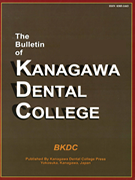- HOME
- > 一般の方
- > バックナンバー:The Bulletin of Kanagawa Dental College
- > 34巻1号
- > アブストラクト
アブストラクト(34巻1号:The Bulletin of Kanagawa Dental College)

English
| Title : | Outcome Measures |
|---|---|
| Subtitle : | BKDC CLINICAL AND RESEARCH TOPICS : Evidence-based Medicine and Dentistry |
| Authors : | Fumie Aizawa, Mitsuo Kishi |
| Authors(kana) : | |
| Organization : | Department of Preventive Dentistry, Iwate Medical University School of Dentistry |
| Journal : | The Bulletin of Kanagawa Dental College |
| Volume : | 34 |
| Number : | 1 |
| Page : | 37-40 |
| Year/Month : | 2006 / 3 |
| Article : | Report |
| Publisher : | Kanagawa Odontological Society |
| Abstract : | [Key Questions] 1. What is an outcome measure? 2. How does one select a suitable outcome measure? 3. How do outcome measures evaluate the suitability of diagnoses? 4. Which outcome measures evaluate the effect of intervention or exposure of risk factors? 5. How do you identify what you want to evaluate? An outcome measure consists of all the features recorded in order to know the progress of a disease or problem that is to be subsequently studied. An outcome should be defined objectively. Moreover, when it is possible to measure it, the result should be set up so that it can be measured anywhere. Therefore, outcome measures should contain reproducibility, reliability, and precision. It is the outcome measure that evaluates the quality of the outcome. Outcomes used in the practice of medicine are : life and death, improvement of a symptom, and recovery from a disease. It is necessary to define an outcome in order to know the effect of risk factors, treatments, or interventions and in order to determine whether it changes in the presence of prospective factors. |
| Practice : | Dentistry |
| Keywords : |
